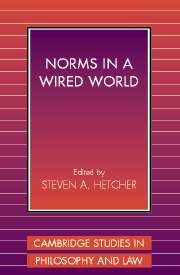Book contents
4 - Emergent Moral Norms
Published online by Cambridge University Press: 05 June 2012
Summary
To some philosophers the notion that moral phenomena – rights and duties or obligations – can be brought into existence by the voluntary action of individuals has appeared utterly mysterious; but this I think has been so because they have not clearly seen how special the moral notions of a right and an obligation are, nor how peculiarly they are connected with the distribution of freedom of choice; it would indeed be mysterious if we could make actions morally good or bad by voluntary choice.
H. L. A. HartIntroduction
Chapters Two and Three discussed rational norms, which are norms conformed to by rational actors. Moral norms, by contrast, are norms conformed to by moral actors. Economists and game theorists typically assume that people are rational actors and moral theorists and sociologists typically assume that people are moral actors. While neither assumption is fully realistic, each can be useful and lead to interesting results.
Starting with a rational choice account is in keeping with the dominant thrust of the literature out of which the previous discussion grew, for generally the rational choice or economic approach has been the dominant framework theorists have applied to analyze the structure of norms. The narrowself-interest account is flawed, however, because it fails to account for the strong evidence of the reality of genuine moral motivation in the workings of social practices. Accepting the reality and potency of moral motivation does not, however, mean one must see these influences as dominant. The most interesting results come from combining the assumptions of rational and moral motivation.
- Type
- Chapter
- Information
- Norms in a Wired World , pp. 96 - 119Publisher: Cambridge University PressPrint publication year: 2004

